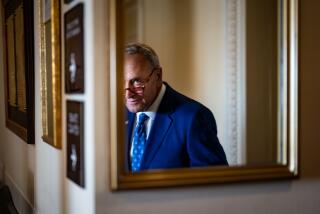Mitchell Predicts Health Care Reform Passage This Year : Legislation: Despite Democrats’ disarray and a GOP ad, the Senate majority leader says final version will resemble Clinton’s in principle.
- Share via
WASHINGTON — Senate Majority Leader George J. Mitchell (D-Me.) says he is not dismayed by apparent disarray among Democrats on health care or by a new Republican ad campaign charging that President Clinton’s reform plan would create a huge government bureaucracy.
Mitchell said in an interview that he continues to believe that Congress will approve health care legislation this year, though he acknowledged that the ultimate version may not resemble Clinton’s original proposal except in principle.
“It will include universal coverage--health care for every American that can’t be taken away--which is the only thing that the President insisted on being in the legislation,” Mitchell said.
“Beyond that, we have to work out a way through the various divisions” of opinion, he conceded.
While that task may seem overwhelming, Mitchell said some lawmakers are merely taking negotiating positions that will yield to future compromises.
“I think we can get the bills through both houses this summer,” Mitchell said, noting that the Senate Labor and Human Resources Committee is now marking up its version of the bill and the Senate Finance Committee soon will do the same.
The process is moving more slowly than expected not because of any stalemate on underlying issues, he said, but because of unforeseen delays by the Congressional Budget Office in making cost estimates for the major proposals under consideration.
“I think it’s obvious to all that the current health care system is not functioning efficiently and there’s a consensus of the American people that it should be changed. but there isn’t a consensus as to what the change should be,” said Mitchell, who is leaving the Senate at the end of this year.
“That’s our challenge--how to make the right changes. The Democrats have an incentive to seek cooperation because we need Republican votes to pass a bill. Republicans don’t want to be seen as obstructionist.”
Asked about the GOP’s $500,000 TV ad campaign, which features high-profile Republicans criticizing Clinton’s plan and calling for relatively modest changes in health insurance practices, Mitchell agreed that it was going to make passage of more substantial health care legislation more difficult.
Leading Republicans in the Senate and House have advocated legislation that would revise some aspects of health care by ending the practice of denying health insurance to people with pre-existing conditions, as well as by making other changes to prevent loss of coverage when people change jobs or become unemployed.
Mitchell, however, said that approach falls short of the broader health care reform goals because it would not provide insurance coverage to the tens of millions of people who do not now have it.
“Their (Republicans’) solution is no solution,” Mitchell said. “Their position is to do as little as possible and say they are for reform.”
Mitchell said he is hoping for more bipartisan cooperation and noted that last week Democrats and Republicans on the Senate Labor and Human Resources Committee had taken “a step in the right direction” by voting unanimously in favor of one cost-control provision.
The committee voted to give a national health board the power to curtail benefits and raise out-of-pocket expenses for consumers if necessary to restrain medical spending.
Mitchell gave high marks to Senate Finance Committee Chairman Daniel Patrick Moynihan (D-N.Y.), who has been sharply critical of some aspects of Clinton’s health care plan.
“I think he’s providing good and effective leadership,” Mitchell said, rejecting as inaccurate many published reports that Moynihan has been an obstacle to passage of a health care bill.
“He obviously doesn’t like parts of the President’s bill--neither do I--but I think he’s committed to action this year on a good reform bill. I am confident that he will play a pivotal leadership role in getting it done.”
Mitchell has taken the lead on the health care issue by conducting discussions at closed sessions of Democratic senators.
“I presented several alternatives--some of which I favor and some of which I don’t--to provoke discussion,” he said. “It ultimately will help in developing a consensus.”
More to Read
Get the L.A. Times Politics newsletter
Deeply reported insights into legislation, politics and policy from Sacramento, Washington and beyond. In your inbox twice per week.
You may occasionally receive promotional content from the Los Angeles Times.










